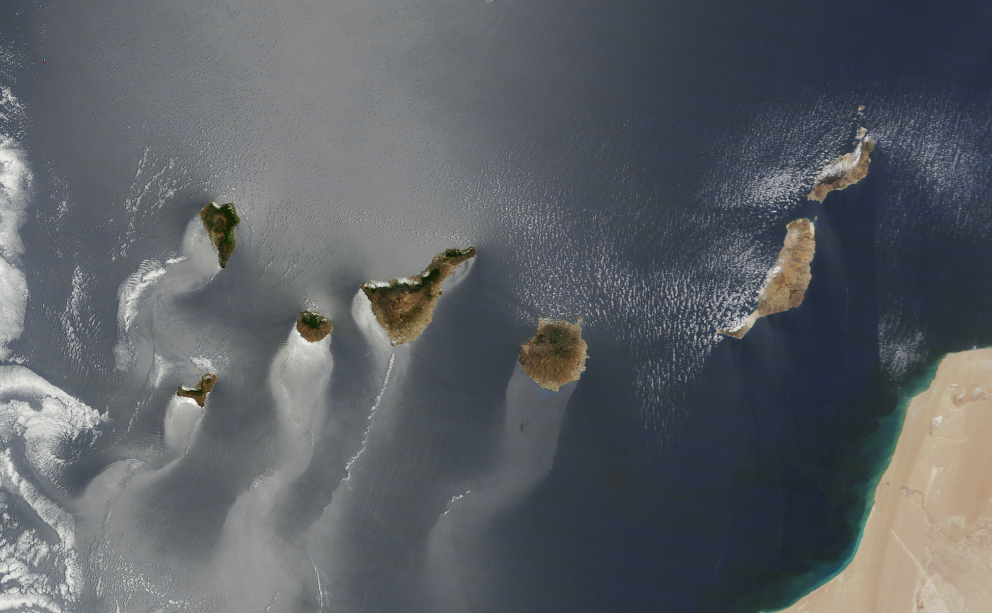
Satellite image of the Canary Islands [NASA].
COMMENTARY / Natalia Reyna Sarmiento
The global pandemic caused by Covid-19 has forced quarantines and other restrictions around the world and this has severely limited the movement of people from one country to another. Nevertheless, the migration phenomenon has continued, including in the case of Europe, where the closure of borders for part of 2020 has not prevented illegal immigration, such as from sub-Saharan Africa. In fact, the health misery of poor countries has added another reason for flight from the countries of origin in this time of pandemic.
The increase in migration in recent decades has been a consequence of various humanitarian challenges. Lack of security, fear of persecution, violence, conflict and poverty, among other reasons, generate a status of vulnerability that in many cases pushes those suffering from these circumstances to leave their country in search of better conditions. The emergence of Covid-19 has been another element of vulnerability in societies with scarce medical resources in the last year as well, while the arrival of migrants without knowing whether or not they were carriers of the virus has aggravated social resistance to immigration in developed economies. The two issues went hand in hand especially in the migration crisis experienced by the Canary Islands throughout 2020, particularly in the last few months.
Fourteen years after the "cayuco crisis", the archipelago experienced another boom in the arrival of migrants (this time the term that has become generalised for their boats is pateras) B . In 2020, more than 23,000 immigrants arrived in the Canary Islands, in crossings that claimed the lives of at least 600 people. If in 2019 around 100 boats with illegal immigrants arrived in the islands, in 2020 there were more than 550, which speaks of a migration phenomenon multiplied by five.
Why has this increase occurred, redirecting to the Canary Islands a flow that has previously sought the Mediterranean route? On the one hand, the sea crossing continues to be the preferred way to reach Europe, as in addition to the cost of the airfare - prohibitive for many - flights require documentation that is often not in possession or that facilitates a control by the authorities - on departure and arrival - that one wishes to avoid. status On the other hand, the difficulties at points along the Mediterranean route, such as stricter policies imposed by Italy on Admissions Office refugees rescued from the sea, or the war in Libya, where routes arrive from Sudan, Nigeria and Chad, for example, have led to part of the pressure from the migratory mafias towards the Canary Islands. Morocco's attitude may also have played a role in this.
Spain has an interest in maintaining a good relationship with Morocco for obvious reasons. Its border with Ceuta and Melilla and its proximity to the Canary Islands make it a neighbour that can contribute both to security and to intensifying migratory pressure on Spanish territory. Precisely at a critical moment in the Canary Islands crisis, the Spanish Interior Minister, Fernando Grande-Marlaska, visited the neighbouring country on 20 November to meet with his Moroccan counterpart, Abdelouafi Laftit, with the intention of requesting the Alawi monarchy's financial aid to put a stop to the migratory crisis. However, although in the following days there was a decrease in the number of arrivals of small boats in the Canary Islands, arrivals were soon on the rise again, leaving Marlaska's visit effective.
On the other hand, in the same weeks, Pablo Iglesias, vice-president of the Spanish government and University Secretary of Podemos, called on Morocco to hold a referendum on the future of Western Sahara, a former Spanish colony under Moroccan tutelage admitted by the UN until the holding of enquiry for the Sahrawi people. The Admissions Office in those same days of Morocco's sovereignty over Western Sahara by the Trump Administration (in exchange for the establishment of diplomatic relations between Morocco and Israel) led Rabat to expect a revision of Spain's position, which is aligned with the UN's approach. The ratification of this by Iglesias and above all his tone of demand led the Moroccan monarch, Mohammed VI, to decide not to receive the Spanish prime minister, Pedro Sánchez, on a trip to the neighbouring country. Other issues, such as Morocco's delimitation of territorial waters in January, expanding its exclusive economic zone, have increased the disagreements between the two countries.
In addition to the normal tension in the Canary Islands due to the arrival of thousands of immigrants in a short period of time, there were also health risks due to the pandemic. Beyond the fears spread by some about the possible entrance of people actually infected with the coronavirus, the protocols established obliged those arriving in small boats to be kept isolated, which caused a problem of overcrowding in facilities that were initially unsuitable.
The Spanish Red Cross set up areas reserved for the isolation of people who tested positive for Covid-19. In addition, temporary macro-camps were set up to rehouse thousands of migrants who were first housed in different hotels. The transfer of groups of migrants by plane to points on the peninsula created controversy that the government had to deal with. The entrance of 2021 has, at least momentarily, eased the pressure.